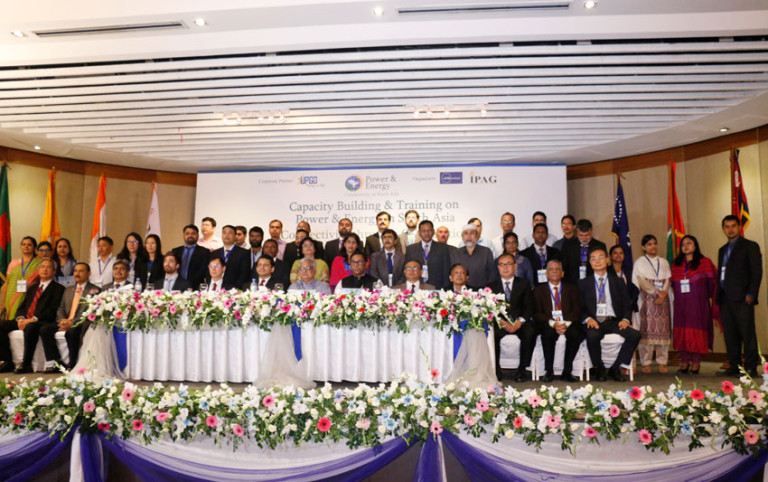
The Two-day Capacity Building & Training Program on ‘Power & Energy in South Asia: Connectivity through Cooperation’ took place on October 21-22, 2016 in Dhaka, Bangladesh. The program was jointly organized by the Institute for Policy, Advocacy, and Governance (IPAG) and Asian Development Bank Institute (ADBI).
The capacity building and training program aimed at providing a comprehensive orientation to senior & mid-level policymakers on different prospects and challenges of energy and power trading in South Asia. It brought together key personnel playing important role in the power and energy sector of South Asia encompassing Afghanistan, Bangladesh, Bhutan, India, Maldives, Nepal, Pakistan, and Sri Lanka. The program provided a platform for experts on power and energy cooperation, government officials, and policy makers to share knowledge, discuss, and explore ways to promote and strengthen energy cooperation in South Asia.
This initiative is the first of its kind in South Asia which facilitated sharing of knowledge and exploring ways to promote energy cooperation in the region of population of 1.7 billion.
The Inaugural of the Program was attended by Dr. Mashiur Rahman, Economic Affairs Adviser to the Prime Minister, Nasrul Hamid MP, State Minister of Power, Energy & Mineral Resources, Mr. Syed Munir Khasru, Chairman of IPAG, Dr. Naoyuki Yoshino, Dean of ADBI and Md. Abdul Mubeen, Chairman of UPGDCL.
The program was structured into 6 training sessions and 2 panel discussions over two days. The training sessions and panel discussions were designed in a way so that the participants get an enhanced understanding of factors contributing to effective cooperation and be better equipped to assess progress on regional energy cooperation in South Asia. The expected impact of the training is equipping policymakers with the ability to make informed decisions for promoting power and energy trading in South Asia.
The topics of the training sessions and trainers are below:
Session I: Power & Energy in South Asia: Policy & Regulatory Framework for Greater Connectivity
Trainer: A.S.M. Alamgir Kabir, Chairman, Power-Energy Management & Engineering Company (PEMEC) & Former Chairman, Bangladesh Power Development Board
Session II: Economics of Power Trading in South Asia: Present Scenario and the Way Forward
Trainer: Dr. Rajiv K Mishra, Director, PTC India Limited
Session III: Potential of Nonconventional Power Trading: Exploring Renewable Energy Sources
Trainer: Dr. Youngho Chang, Assistant Professor, Nanyang Technological University, Singapore
Session IV: Technical Integration: Harmonizing Standards and Connecting South Asia
Trainer: Wilhelm Söderström, Senior Consultant, Nord Pool Consulting AS , Norway
Session V: Financial Considerations: Investment for Energy Cooperation in South Asia
Trainer: V.K. Kharbanda, Project Director, South Asia Regional Initiative for Energy Integration (SARI/EI), Integrated Research and Action for Development (IRADe)
Session VI: Building Institutional Capacity
Trainers: Mr. Syed Munir Khasru, Chairman, IPAG and Dr. Bokhwan Yu, Deputy Dean, Asian Development Bank Institute (ADBI)
The topics of the panel discussions and a detailed list of participants are below:
Panel Discussion I: Sustainable Energy and Power Sector Development
Moderator: A.S.M. Alamgir Kabir, Chairman, Power-Energy Management & Engineering Company (PEMEC) & Former Chairman, Bangladesh Power Development Board (BPDB)
Panelists:
Panel Discussion II: Global Best Practices: Lessons for South Asia
Moderator: Mr. Syed Munir Khasru, Chairman, IPAG
Panelists:
On this occasion, a book by IPAG was released on ‘Prospects and Challenges of Connectivity & Trading in Power & Energy: A Regional & International Perspective’ which has articles from national as well as international experts from ten countries.